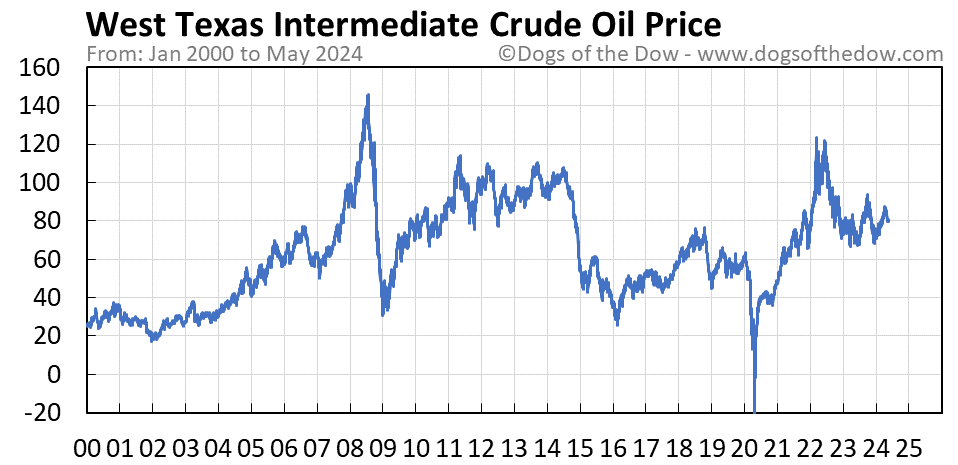Part of the human condition seems to be the desire to seek consensus so we can promote our agendas while at the same time many of us tend to nitpick at the views of others if they are not absolutely and totally in sync. This becomes a huge barrier to moving forward on such a major life-altering plan as to the best way to approach long-term energy strategy. This spills over into attitudes over global warming, climate change, social fairness, and whether mankind will eventually run out of needed resources or simply expand into the universe.
 |
| The Price Of Oil Has Taken Some Wild Swings |
Over the years the price of oil has taken some wild moves both up and down. These have generally been due to supply or demand changes. Today the world should get ready to face the possibility, that when it comes to oil, much of the low-hanging fruit has been picked and we should consider the possibility these countries have been lying for years about just how much oil they really have left. Clearly, the recent price shocks in the energy sector have made the current inflationary surge and slowdown in the growth of the global economy more acute, unfortunately, other problems exist.
The highly productive “sweet spots” where oil flows from the ground sometimes mentioned on the news make up only a small percentage of potential drilling areas. Outside those core areas, production rates and recoveries are substantially lower. Impressive gains in well productivity have come as a result of technology that allows one tight oil well to access three times the reservoir volume of one drilled in 2012 and a shale gas well can now access 2.2 times the reservoir volume of a well drilled in 2012. Still, technology cannot overcome “poorer quality geology” and this challenge will become evident as drilling moves into lower quality areas.
Engineering limits appear to have been reached for increased lateral lengths and the increased yields from hydraulic fracturing or "fracking." While technology has increased well productivity and temporarily improved the economy it has also rapidly reduced available drilling locations must faster. Now as the rate of technological improvements slows the EIA is failing to consider that better technology will no longer offset the deteriorating geology as new drilling moves outside of sweet spots. In short, declining yields will inevitably overcome increased drilling rates and production will fall.
To get a sense of what the future holds for U.S. tight oil and shale gas it is suggested we look at where the shale revolution began. The Barnett Shale is where ‘fracking’ was developed by [George] Mitchell in the 1990s. First, they drilled the sweet spots and then spread out to the less promising areas. Already production has declined 60 percent since the play peaked in 2011. The fact is energy companies always exploit the most productive areas of a reservoir first. Failure to recognize this practice mistakes exploitation of the most productive areas for technological progress. Hughes thinks we are rapidly towards the same scenario we saw unfold at Barnett Shale much sooner than the EIA or policymakers are willing to admit.
As for nuclear power, here in America, we have a slew of old plants still online. Most have already had their license to operate extended past what was initially considered their useful life. With few people wanting a nuclear plant constructed near them and these expensive monsters taking many years to build, it is unlikely nuclear power will come to our rescue anytime soon. If nuclear energy had proven in its totality to be the answer many people envisioned decades ago, we would not be in this situation.
Another puzzling policy is that society is promoting Electric Vehicles as our salvation knowing that most of the time they are charged using electricity generated by fossil fuels. Even if charged in off-peak hours, that does not change. Anyone with even the slightest mechanical knowledge will tell you that solar panels, windmills, and such take a lot of energy to build and often are maintenance intense. Both these complicated systems have a short lifespan and require a great deal of energy to be expended in just keeping them up and running. This includes all the BTUs being burned in producing parts that need to be constantly replaced. This was one of my arguments years ago when I expressed concern the optimism surrounding ethanol was being over-hyped.
Still, whether ethanol is good for the environment has not stopped Biden from proposing increasing the amount of ethanol added to gasoline. With corn prices at record highs and people talking about food shortages some people think this is incredibly stupid. When you do not create enough "net gain" in energy from the
total energy produced minus energy expended to produce it, you have a problem. If we cannot claim a major victory in
resolving our energy problem, the energy we produce in the
future will very likely be very expensive.
Carry no illusions the days of cheap energy are behind us, the low-hanging fruit has been picked and eaten. Sadly, if we look back we see much of this energy was simply wasted. America has adopted the same attitude towards its buildings. In our fast-changing world, we have made everything disposable. America's remove and replace mentality tends not to maximize gains or resources and creates a huge amount of waste. Often there is no way to reclaim much of this and even recycling is inefficient. This has extended down to the point where most consumer goods are now unrepairable. Fast growth that lacks quality runs rampant in modern society.
The pathetic reality is that those making energy policy often ignore waste because it is good for the GDP. Simply put, this is about money, cutting back on waste would lower the GDP and hurt the profit of many companies. It is time voters demand politicians put cutting waste as a priority before their desire to serve big business and the lobbyists that shower Washington with money. With this in mind, it could be argued we don't need a "new green deal" as much as a little common sense. The dreaded "C" word, conserve, is seldom used by politicians because cutting waste will crush the GDP.
Simply conserving our resources and cutting down on waste has been thrown under the bus and to speak of it is taboo. When people conserve it cuts GDP. Energy use soaring during extremely hot or cold months adds to overall consumption and the GDP. Over the last several years I have entered many large empty buildings and offices in the evenings or during weekends. Often the thermostats on these empty buildings are not set-back and these buildings are at seventy degrees while extreme temperatures exist outside. Instead of mentioning such things, the ideas being forth from those promoting "go green" are proposing solutions to our woes that appear to be pie-in-the-sky visions that make little sense.
A couple of final thoughts, while few people look at it this way, it could be argued that even the
Biden Administration's open border policies are adding to America's energy
problems. Last year it is estimated the illegal immigrant population in the United States increased by one million in President Joe Biden’s
first year in office, according to a new report. Each of these people
use energy and have a carbon footprint. Simply put, more people equal
more energy used. To top this off we hear of our government putting these people on planes to fly them north, if you want to move them around busing them would be far more environmentally friendly.
If this is all being directed from behind the curtain by those with an agenda we are all screwed. If this is all being done by design, we have a problem. It means this goes past stupidity and incompetence, it falls into an area that is much darker. If we are looking at a planned energy squeeze the general population or call us the unsanctioned masses are in for a world where we will be powerless. An example of what we might face is a cashless society where all cars are driverless, a society where you could buy nothing unless it was approved, you could go nowhere unless it was approved, and you would find yourself in the dark unless you behave.
The link to (Part 1) of this article is; https://brucewilds.blogspot.com/2022/04/oil-and-energy-shortages-may-just-be.html
(Republishing of this article welcomed with reference to Bruce Wilds/AdvancingTime Blog)

Leaving aside the debt-fueled chicanery of GDP, your mention of West Texas Intermediate crude oil gets coverage in this May 9th 2022 article by Bloomberg:
ReplyDelete"Sorry, But for You, Oil Trades at $250 a Barrel - The culprit is the refinery margin and the consequences are huge for global inflation."
https://www.bloomberg.com/opinion/articles/2022-05-09/crude-hovers-at-110-a-barrel-but-the-refinery-margin-makes-us-pay-a-lot-more?sref=5dj0X2VO
It is good to get 'a little mentioned' peek under the bonnet.